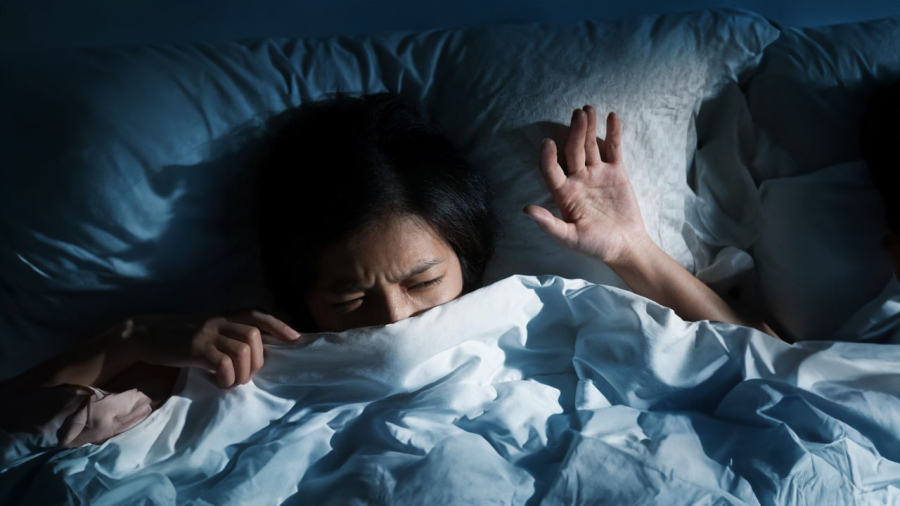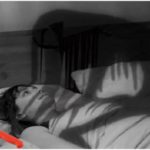Sleep paralysis is a phenomenon that occurs while sleeping, where one feels someone choking them and unable to move or breathe. Folklore suggests that sleep paralysis is more likely to occur when sleeping in a place with heavy negative energy, supernatural presence, or for people who are spiritually weak.
From a scientific perspective, sleep paralysis, also known as hypnagogic or hypnopompic paralysis, can occur in individuals with sleep disorders, mental health disorders, or as a result of certain medications. When we sleep, our brain sends signals to relax the muscles in our arms and legs, resulting in temporary loss of muscle strength and a state of paralysis during the rapid eye movement (REM) sleep stage. This phenomenon usually occurs 70 to 90 minutes into sleep.
Sleep paralysis occurs when the brain remains awake. During this time, individuals are conscious but unable to move their limbs or speak, and may experience hallucinations for a few minutes.

Sleep disorders and sleep paralysis
A 2010 study conducted by the National Yang-Ming University (Taiwan) involved 100 participants. The results showed that sleep paralysis is more common in individuals with chronic insomnia, circadian rhythm disorders, and sleep apnea. Among these cases, 38% experienced sleep apnea due to obstruction.
Sleep disorders significantly affect the quality, quantity, and duration of sleep. As a result, individuals may experience discomfort during the day and a decrease in cognitive function at night. This decrease in cognitive function can lead to sleep paralysis. Sleep paralysis is more likely to occur when sleeping on your back, as this position can lead to snoring and obstructive sleep apnea, causing the brain to enter a hazy state.
Narcolepsy and sleep paralysis
Individuals with narcolepsy often have difficulty controlling their sleep-wake cycles due to a lack of a neurotransmitter called orexin. Orexin plays a role in promoting wakefulness and inhibiting REM sleep. When there is a deficiency of this neurotransmitter, the brain is more prone to experiencing paralysis after falling asleep frequently.
Signs of narcolepsy include fragmented sleep, hallucinations, excessive daytime sleepiness, or muscle weakness. Individuals who frequently experience narcolepsy due to working night shifts and constantly shifting their sleep schedules are more likely to experience sleep paralysis.
Mental health disorders
Individuals with post-traumatic stress disorder, a history of physical and mental trauma, generalized anxiety disorders, are more prone to sleep paralysis. The combination of hallucinations, distorted thoughts, and disruptive behavior can reduce daily functioning and lead to anxiety, which can result in sleep paralysis.
Individuals who have vivid dreams are also more likely to experience sleep paralysis. According to scientists, the belief in the supernatural can contribute to an increase in hallucinations.
Preventing sleep paralysis
Those who believe in the folk beliefs of sleep paralysis being caused by negative energy or supernatural forces often resort to using garlic, sharp objects under pillows, or reciting Buddhist prayers to alleviate this condition. However, it can also be understood that individuals are more prone to experiencing sleep paralysis when they are scared or weak, and when they are mentally strong, they won’t experience it.
Experts recommend having a regular sleep schedule to avoid constant disruptions and ensuring an adequate amount of sleep to prevent sleep paralysis. It is also important to reduce caffeine intake, stimulants, avoid late-night snacking, and refrain from using phones and computers before bedtime to minimize exposure to blue light. Engaging in relaxing activities such as taking a bath, reading books, or listening to soothing music can help reduce sleep paralysis.
It is important to aim for 7-8 hours of sleep each day and maintain a balanced lifestyle.
Create a clean and comfortable sleeping environment. Avoid wearing tight clothing to bed for added comfort.
Engaging in regular physical activity ensures a healthy body and promotes better sleep.
Avoid overeating or consuming alcohol before bedtime.
Quit smoking, as nicotine can stimulate and disrupt sleep, resulting in vivid dreams.
While sleep paralysis is not harmful, it can affect mental health and lead to negative thoughts when going to sleep, resulting in a decrease in the quality of sleep. Therefore, it is important to take measures to avoid this phenomenon.
Is it beneficial to place a knife by the bedside to ward off evil spirits and ensure a good night’s sleep? Beware of feng shui taboos that may bring bad luck.
Many people believe in the power of folk remedies to ward off evil spirits and protect themselves from supernatural entities. One popular practice that has been passed down through generations is the tradition of placing a knife or a sharp object at the head of the bed. This act is believed to keep evil forces at bay and ensure a peaceful sleep. While the effectiveness of this practice is subjective, it continues to be embraced by those seeking additional protection and a sense of security.



































